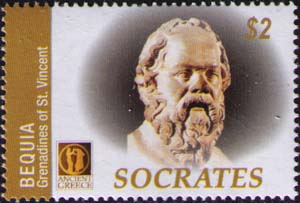
The great Greek philosopher Socrates believed that the wise person would instinctively lead a frugal life.
He himself would not even wear shoes; yet he constantly fell under the spell of the marketplace and would go there often to look at the wares on display.
When one of his friends asked why, Socrates said, “I love to go there and discover how many things I am perfectly happy without.”
Image: A 2004 postage stamp on Socrates from Bequia, an island in Saint Vincent and the Grenadines in the eastern Caribbean, courtesy www.philatelia.net.
Socrates (c. 470–399 BC) was a Greek philosopher from Athens who is credited as the founder of Western philosophy and among the first moral philosophers of the ethical tradition of thought. An enigmatic figure, Socrates authored no texts and is known mainly through the posthumous accounts of classical writers, particularly his students Plato and Xenophon. These accounts are written as dialogues, in which Socrates and his interlocutors examine a subject in the style of question and answer; they gave rise to the Socratic dialogue literary genre. Contradictory accounts of Socrates make a reconstruction of his philosophy nearly impossible, a situation known as the Socratic problem.
